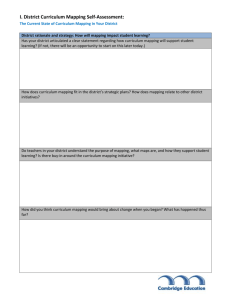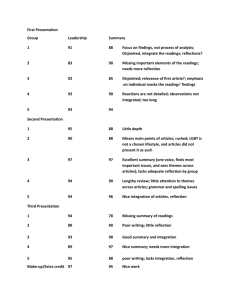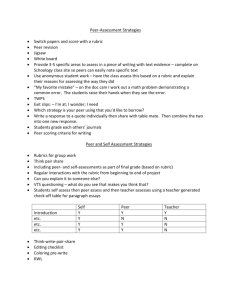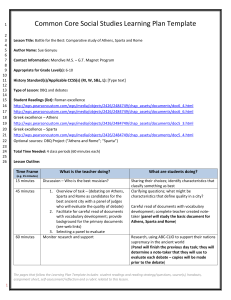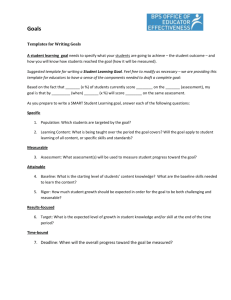11AW 19th and 20th Century Immigration Policy Debating Problems
advertisement
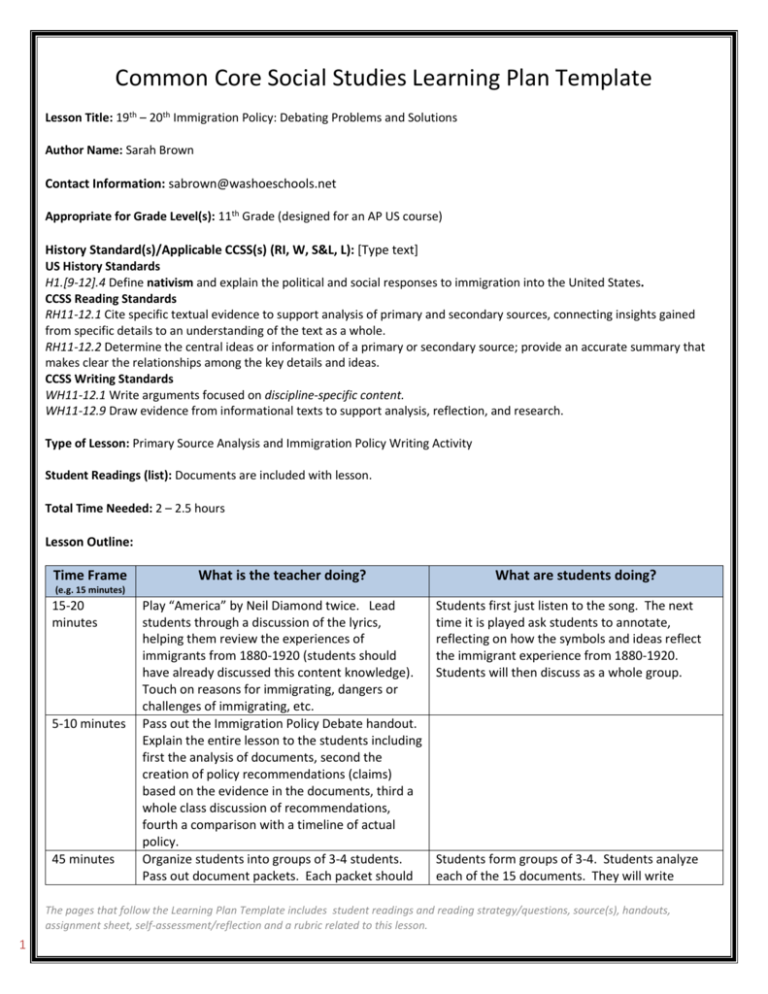
Common Core Social Studies Learning Plan Template Lesson Title: 19th – 20th Immigration Policy: Debating Problems and Solutions Author Name: Sarah Brown Contact Information: sabrown@washoeschools.net Appropriate for Grade Level(s): 11th Grade (designed for an AP US course) History Standard(s)/Applicable CCSS(s) (RI, W, S&L, L): [Type text] US History Standards H1.[9-12].4 Define nativism and explain the political and social responses to immigration into the United States. CCSS Reading Standards RH11-12.1 Cite specific textual evidence to support analysis of primary and secondary sources, connecting insights gained from specific details to an understanding of the text as a whole. RH11-12.2 Determine the central ideas or information of a primary or secondary source; provide an accurate summary that makes clear the relationships among the key details and ideas. CCSS Writing Standards WH11-12.1 Write arguments focused on discipline-specific content. WH11-12.9 Draw evidence from informational texts to support analysis, reflection, and research. Type of Lesson: Primary Source Analysis and Immigration Policy Writing Activity Student Readings (list): Documents are included with lesson. Total Time Needed: 2 – 2.5 hours Lesson Outline: Time Frame What is the teacher doing? What are students doing? (e.g. 15 minutes) 15-20 minutes 5-10 minutes 45 minutes Play “America” by Neil Diamond twice. Lead students through a discussion of the lyrics, helping them review the experiences of immigrants from 1880-1920 (students should have already discussed this content knowledge). Touch on reasons for immigrating, dangers or challenges of immigrating, etc. Pass out the Immigration Policy Debate handout. Explain the entire lesson to the students including first the analysis of documents, second the creation of policy recommendations (claims) based on the evidence in the documents, third a whole class discussion of recommendations, fourth a comparison with a timeline of actual policy. Organize students into groups of 3-4 students. Pass out document packets. Each packet should Students first just listen to the song. The next time it is played ask students to annotate, reflecting on how the symbols and ideas reflect the immigrant experience from 1880-1920. Students will then discuss as a whole group. Students form groups of 3-4. Students analyze each of the 15 documents. They will write The pages that follow the Learning Plan Template includes student readings and reading strategy/questions, source(s), handouts, assignment sheet, self-assessment/reflection and a rubric related to this lesson. 1 15-20 minutes 30-40 minutes 15 minutes include one set of laminated documents. Pass out an overhead marker to each student. Ask students to work together analyzing and annotating directly on each document. Move around the room facilitating discussion and analysis. Instruct students to work together to create policy recommendations for each of the two essential questions asked on their handout. They will cite evidence to support their decisions. Move around the room to help students. Instruct students to form one large circle with their desks. Acting as “President,” facilitate a discussion of policy recommendations. Transition students into a discussion requiring them to come to consensus about recommendations. Appoint one student to act as scribe on the board. Post a timeline of immigration policy from 1880 – 1924. As you move thorough the timeline chronologically with students, ask them to make comparisons with their own recommendations. thoughts and ideas directly on each laminated document as they discuss as a group. Students will discuss and write down policy recommendations (claims) supported by evidence for both essential questions on the handout. Students will discuss policy recommendations and provide evidence to support their suggestions. While participating, students will take notes on alternative or additional suggestions and the evidence given in support. Students will come to consensus and a scribe will write down the agreed upon recommendations. Then all students will write down the agreed upon recommendations on their own worksheet. Students will be prompted to discuss similarities and differences with the recommendations they proposed. They will likely notice many similarities and concerns that they addressed. Description of Lesson Assessment: Students will be assessed informally throughout the lesson as the teacher monitors and facilitates document analysis and completion of the policy debate preparation worksheet. Formal assessment will occur when the teacher records student participation and arguments during the debate, reviews preparation worksheet and note taker. How will students reflect on the process and their learning? Students will reflect on the content of the lesson as they write evaluate their recommendations when compared to the timeline of actual immigration policies. They will also reflect on their position during the socratic seminar as they listen to alternative perspetives from their peers. The pages that follow the Learning Plan Template includes student readings and reading strategy/questions, source(s), handouts, assignment sheet, self-assessment/reflection and a rubric related to this lesson. 19th Century Immigration Policy Debate Name ____________________________ Date ______ By the late 19th century large numbers of immigrants were coming to America from all over the world. America’s response to immigration was varied. In this activity, you will decide what response the U.S. government should have toward immigration at the turn of the century, 1880-1920. You must consider economic, political, and social concerns and both immigration policy and policies for immigrants once they arrive. Task: You are a team of policy experts appointed by the President. Your job is to determine an appropriate policy on immigration and immigrants. The President has divided the team into several groups who will be given the same evidence and task. Each group will present and discuss their recommendations with the team and come to a consensus. 1. Read, analyze, and sort through the evidence provided to you in the envelope from the President. 2. Determine a policy approach for the U.S. government by responding to the following questions and providing evidentiary support for your decisions. 3. Present and discuss your recommendations with the whole team (class) and come to consensus. Policy Recommendations 1. Should there be restrictions on how many immigrants are permitted to enter America or who is permitted entry? If so what should those be and why? Policy Recommendations (Claims) Evidentiary Support 2. To what extent and in what ways should the government help immigrants once they have been permitted to enter America? Policy Recommendations (Claims) Evidentiary Support The pages that follow the Learning Plan Template includes student readings and reading strategy/questions, source(s), handouts, assignment sheet, self-assessment/reflection and a rubric related to this lesson. Discussion of Policy Recommendations Opposing or Alternative Policy Recommendations (Claims) Evidentiary Support Given Concluding with Consensus List the policy recommendations your team (class) will present to the President. The pages that follow the Learning Plan Template includes student readings and reading strategy/questions, source(s), handouts, assignment sheet, self-assessment/reflection and a rubric related to this lesson. Document 1 New York City, Immigrant Neighborhood, 1900s Document 2 Expert from Home Mission Societies, 1900’s Unrestricted and unregulated immigration would not be wise either on our eastern or western coasts. We need the most careful consideration of the character of our future citizenship. But when we have decided who may be admitted to our land, let us receive all who come with a true Christian courtesy. It is not wholly a matter of legislation and officialism. The observant writer of this little story indicates clearly the significance of what should be done to give our new guests a kindly welcome. The Golden Gate and Angel Island should be worthy of their beautiful names. Here is an important task for the Christian women of our Home Mission Societies. The pages that follow the Learning Plan Template includes student readings and reading strategy/questions, source(s), handouts, assignment sheet, self-assessment/reflection and a rubric related to this lesson. Document 3 Political Cartoon, San Francisco Chronicle, 1890’s The pages that follow the Learning Plan Template includes student readings and reading strategy/questions, source(s), handouts, assignment sheet, self-assessment/reflection and a rubric related to this lesson. Document 4 Chinese Immigrant, California, 1910’s America has power, but no justice In prison, we were victimized as if we were guilty Given no opportunity to explain, it was really brutal I bow my head in reflection but there is nothing I can do Document 5 Puck Magazine, April 28, 1880 The pages that follow the Learning Plan Template includes student readings and reading strategy/questions, source(s), handouts, assignment sheet, self-assessment/reflection and a rubric related to this lesson. Document 6 The Wasp, March 3, 1882 The pages that follow the Learning Plan Template includes student readings and reading strategy/questions, source(s), handouts, assignment sheet, self-assessment/reflection and a rubric related to this lesson. Document 7 Judge Magazine, 1903 The pages that follow the Learning Plan Template includes student readings and reading strategy/questions, source(s), handouts, assignment sheet, self-assessment/reflection and a rubric related to this lesson. Document 8 Jacob Riis, New York City Tenement, 1880 The pages that follow the Learning Plan Template includes student readings and reading strategy/questions, source(s), handouts, assignment sheet, self-assessment/reflection and a rubric related to this lesson. Document 9 Report Cards, New York City Immigrants, 1903 The pages that follow the Learning Plan Template includes student readings and reading strategy/questions, source(s), handouts, assignment sheet, self-assessment/reflection and a rubric related to this lesson. The pages that follow the Learning Plan Template includes student readings and reading strategy/questions, source(s), handouts, assignment sheet, self-assessment/reflection and a rubric related to this lesson. Document 10 James Bryce, The American Commonwealth, 1888 A certain part of this recent immigration is transitory. Italians and Slovaks, for instance, after they have by thrift accumulated a sum which is large for them, return to their native villages, and carry back with them new notions and habits which set up a ferment among the simple rustics of a Calabrian or North Hungarian Valley. For the United States the practice has the double advantage of supplying a volume of cheap unskilled labour when employment is brisk and of removing it when employment becomes slack, so that the number of the unemployed, often very large when a financial crisis has brought bad times, is rapidly reduced, and there is more work for the permanently settled part of the laboring class. It is the easier to go backwards and forwards, because two thirds among all the races except the Jews, are men, either unmarried youths or persons who have left their wives behind. Document 111 National People’s Party platform, 1892, Expression of Sentiments Resolved, That we condemn the fallacy of protecting American labor under the present system, which opens our ports to the pauper and criminal classes of the world and crowds out our wage-earners; and we denounce the present ineffective laws against contract labor, and demand the further restriction of undesirable emigration. Document 12 Report of the Commissioner General of Immigration, 1908 In order that the best results might follow from an enforcement of the regulations, an understanding was reached with Japan that the existing policy of discouraging emigration of its subjects of the laboring classes to continental United States should continue, and should, by co-operation with the governments, be made as effective as possible. Document 13 Edward A. Ross, Century Magazine, 1914 In 1908, on the occasion of a “homecoming” celebration in Boston, a newspaper told how the returning sons of Boston were “greeted by Mayor Fitzgerald and the following members of Congress: O’Connell, Kelihar, Sullivan, and McNary—following in the footsteps of Webster, Sumner, Adams, and Hoar. They were told of the great work as Mayor of the late beloved Patrick Collins. At the City Hall they found the sons of Irish exiles and immigrants administering the affairs of the metropolis of New England. Besides the Mayor, they were greeted by John J. Murphy, Chairman of the Board of Assessors; Commissioner of Streets Doyle; Commissioner of Baths O’Brien . . . Police Commissioner O’Meara.” The pages that follow the Learning Plan Template includes student readings and reading strategy/questions, source(s), handouts, assignment sheet, self-assessment/reflection and a rubric related to this lesson. Document 14 The Literary Digest, May 7, 1921 The pages that follow the Learning Plan Template includes student readings and reading strategy/questions, source(s), handouts, assignment sheet, self-assessment/reflection and a rubric related to this lesson. Document 15 Robert H. Clancey, Congressman reacting to Immigration Act of 1924 Forty or fifty thousand Italian-Americans live in my district in Detroit. They are found in all walks and classes of life — common hard labor, the trades, business, law, medicine, dentistry, art, literature, banking, and so forth. They rapidly become Americanized, build homes, and make themselves into good citizens. They brought hardihood, physique, hope, and good humor with them from their outdoor life in Sunny Italy, and they bear up under the terrific strain of life and work in busy Detroit. One finds them by thousands digging streets, sewers, and building foundations, and in the automobile and iron and steel fabric factories of various sorts. They do the hard work that the native-born American dislikes. Rapidly they rise in life and join the so-called middle and upper classes. . . . The pages that follow the Learning Plan Template includes student readings and reading strategy/questions, source(s), handouts, assignment sheet, self-assessment/reflection and a rubric related to this lesson.

